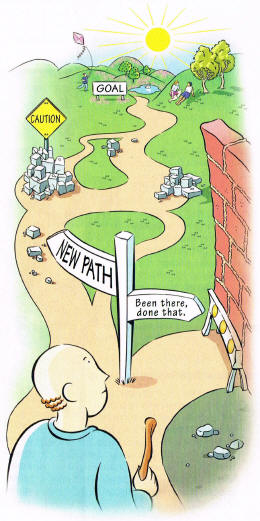Stress
(Part 2) |
Changing Your Response
You are the only person responsible for your thoughts
and actions. This simple idea is your most powerful tool
for managing stress. Start by having realistic expectations.
Then learn to recognize what you can −and can't− control.
Finally, think about ways to change your response. With
practice, you can learn to let go of stressful ways of thinking.
|
Have Realistic Expectations
Life is full of unexpected events. Often things don't turn out the
way we thought they would −or should.
So it's important to be
realistic. When it comes to events that cause you stress, ask
yourself:
●
What are my expectations?
● How likely is it that my expectations, good or bad,
will be met? Are they realistic?
● If they aren't met, do I have to respond by feeling
bad? How can I work with other outcomes?
|

|
|

|
Understand What You Can Do
Even when you can't change a stressful situation, you can control your
response. For example, you can't control traffic. But you can
control whether a traffic jam makes you angry. To get better at
managing stress, try these tips:
●
Put the stressor in perspective.
Will being late to
work really get you fired?
●
Be flexible and look for answers.
If you're stuck in
traffic, try calling to let people know you're on the
way.
●
Plan
ahead for next time.
If being late is a worry,
plan to leave a few minutes
earlier.
|
Make Mountains into
Molehills
A common cause of stress is feeling as if you have to solve all your
problems at once. To shake this feeling, learn to take things one
step at a time.
Try to break big problems into smaller tasks that
you can handle. That way, worries that seem like mountains become little
hills you can climb over. Remember, taking small steps will carry
you forward.
Stay on the Path
Learning to manage stress takes time.
No matter how good you get at it, there will still be stumbling blocks
along the road. And on some days you'll manage stress better than on
others. Also, keep
in mind that some stress is natural −like the night before a job
interview. In any case, remind yourself that, when the event is
over, the stress will be gone too.
By keeping focused on your goals,
you can stay on the path to a less stressful life.
|

|
|
Working on a Positive Lifestyle
Learning to manage stress doesn't happen overnight. It's a
process.
The more you keep at it, the more you'll feel in control of daily events.
This means less stress at home, at work and in your community. |
|
 |
Set Limits
Trying to fit too much into a day is a major cause of stress.
Setting limits will help you feel more in control. This sometimes
means saying no −to people and even to
things you might want to do.
This can be hard at times.
But knowing your priorities can help you
make choices.
In the Workplace
To reduce stress at work, try to prioritize your schedule. Make time
for meals and short breaks.
If it's permitted, put a relaxing
picture in your work area. Improve on skills that can help reduce stress.
Take a public speaking class, for instance. And when faced with a
stressor like a big project, break the job into smaller, more manageable tasks.
Know Your Priorities
Using your time and energy wisely is a good way to control stress.
Save time for the things that matter most in your life. Ask
yourself: Do I really need to do this? Do I want to do this?
If you answer "yes", go ahead. But keep in mind you
can also answer
"no".
|
In the Home
Enjoy your time at home. Gardening, taking up a hobby or writing in
a journal can be great stress relievers. Having friends over is
good, too.
Also, leave plenty of time for family fun. Have a
cookout. Play games together. And try
to share
at least one meal each day.

|

|
|

|
Stress and Children
Be careful not to take stress out on your children.
They may not
understand why you're stressed.
But they can sense your moods.
Be aware that many children −especially teenagers− are under stress, too.
So plan time to talk with your kids.
Ask them about school and any
problems they're having. Finally, make sure they have plenty of time
for just being kids and having fun.
|
Learn to Accept Support
Everybody needs support now and then. So don't feel embarrassed to ask for
help when you need it.
Most people are glad to lend a hand.
And asking for help can open up new lines of communication and
friendships.
In the Community
Taking part in community or faith-based events can offer
a sense of
belonging. It also helps put you in touch with active and caring
people nearby. So whether it's a cleanup day at a local park or
taking meals to the elderly, try to reach out to friends and neighbors.
Just remember: Taking time for yourself once in a while makes it easier
to help others later on.
|

|
|
Top
of Page |


![]()
![]()